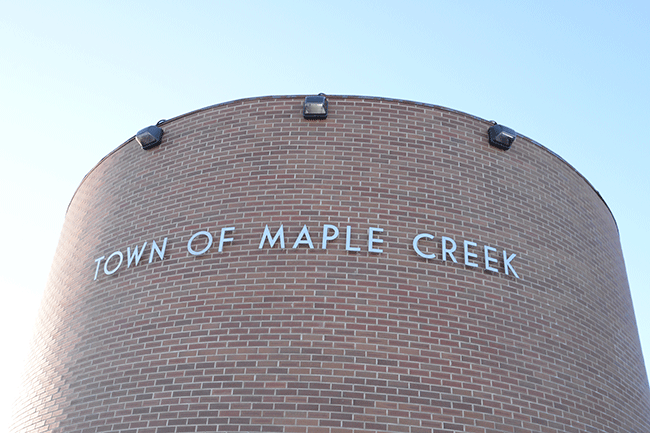Revenue sharing a hot topic at SUMA convention
Posted on February 10, 2015 by Maple Creek FILE PHOTO
FILE PHOTOBy Marcia Love
Municipal revenue sharing, community policing and missing and murdered aboriginal women were among the serious topics of discussion at the Saskatchewan Urban Municipalities Association (SUMA) Convention Feb. 1-4 in Saskatoon.
The conference was attended by Mayor Barry Rudd, town administrator Michele Schmidt, assistant administrator Debbie Machay and councillors Barry Elderkin, Ellaine Hawrylak, Tina Cresswell and Michelle McKenzie and Maple Creek Main Street Program co-ordinator and community development officer Royce Pettyjohn.
In his address to the delegates on Feb. 2, Premier Brad Wall said his government is still unsure how the slump in oil prices will impact revenue sharing. He said the province will face a budget shortfall of $600-$800 million this year due to decreased oil revenues.
Rudd said municipalities did not expect to hear any actual answers yet on how this will impact revenue sharing. Wall had previously hinted the revenue-sharing formula may have to be adjusted in order for the province to meet its promise that there will not be a deficit in the budget. Municipalities share one percentage point of the provincial sales tax – 20 per cent of all PST revenue – which would amount to $257 million this year.
Last year Regina received $40 million from municipal revenue sharing and Saskatoon received $46 million. Maple Creek was alloted just under $500,000.
Rudd said the town will be facing tough decisions if this is cut.
“If you don’t get it, what do you do? You cut services or you raise taxes, and there’s not too many municipalities that have ratepayers that are willing to see more tax increases. So you cut services,” he stated.
While the town will still have its operational budget, other projects on the town’s to-do list may not be touched for a few years if the money isn’t there.
“If there’s half a million dollars (gone), then there’s going to be a lot of things that aren’t going to be done,” Rudd said.
This may include work on the north lift station – which the mayor estimated could cost $100,000 – or cutting the sidewalk budget and only fixing what’s absolutely necessary.
“If you can nurse it through with stuff like that, then you don’t do (the work),” he said.
The fate of revenue sharing will be revealed when the provincial budget is released next month.
Community policing
Other major topics of discussion included the Community Safety Officer Program, which the province announced late last year. Training will be offered for community safety officers (CSOs), allowing them to deal with low-level complaints involving traffic laws and local bylaws. The intention is for CSOs to tackle these minor issues and allow RCMP and municipal police to focus on higher impact problems.
The town had talked about having its bylaw officer receive the training to address issues such as speeding, but it is cost-prohibitive. The CSO must have radio contact with emergency dispatch – a service that comes at a cost of $24,000 a year. The town was looking into sharing a CSO with surrounding villages and RMs, but the province has introduced a legislation which won’t allow this.
“It’s not something that we’re going to see here,” Rudd stated.
SUMA backs inquiry
SUMA delegates want an inquiry into missing and murdered aboriginal women.
The vast majority voted in favour of a resolution brought forward by the City of North Battleford during the conference on Feb. 3.
Aboriginals account for 55 per cent of female homicide victims in Saskatchewan – the highest percentage of all the provinces.
The federal government has stated it won’t fund an inquiry, saying studies have already been done and it is funding programs aimed at stopping violence against aboriginal women.
In another discussion, delegates voted in favour of making bicycle helmets mandatory for all ages. The City of Prince Albert brought forward the resolution, which was passed by the majority. SUMA will lobby SGI for a change in the Highway Traffic Act that would make bike helmets mandatory for cyclists of all ages.
Rudd also noted SUMA and the Saskatchewan Association of Rural Municipalities (SARM) continue to collaborate when it comes to pushing for change.
“They’re on a very good track in working together and partnering on a lot of stuff where you’re lobbying the government and whatnot because numbers talk,” he explained. “When you’re talking roads and infrastructure, we need each other. SUMA is very important to SARM, and SARM is very important to SUMA.”
On the map
Maple Creek itself continues to be very popular at conferences such as SUMA because of the progress it has made in recent years.
“With the Main Street Program, Communities in Bloom, the Cypress Hills Destination Area, the heritage program, the new integrated healthcare facility, getting a new hotel built and the old hotel renovated – people are asking us, ‘What are you doing and how are you supporting it?'” the mayor said. “The networking part of (the convention) is valuable, too.”
Hawrylak recognized
Councillor Ellaine Hawrylak received an award for her years of service on town council during the president’s banquet on Feb. 3. She has been a council member for 25 years.
Hawrylak was one of nearly 40 representatives from various municipalities to be honoured for their contributions.
“It’s nice to give them recognition for their dedication,” Rudd said, noting the only reward councillors take away is serving their community. “You do it because you care about your community and you want to see change.”


Leave a Reply
You must be logged in to post a comment.